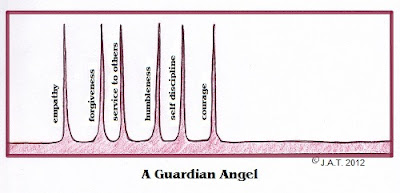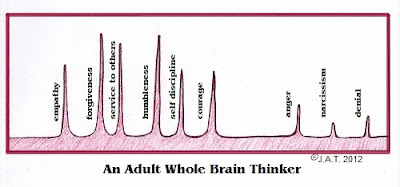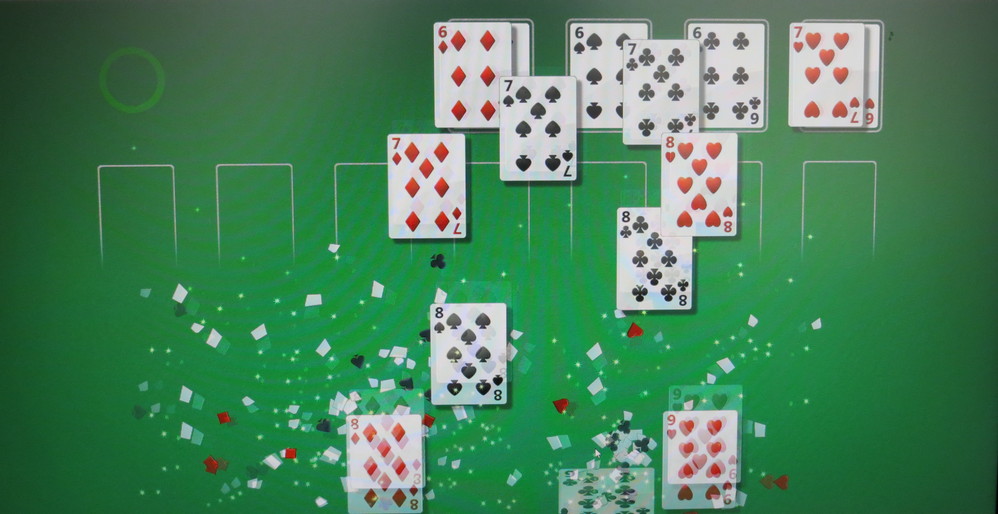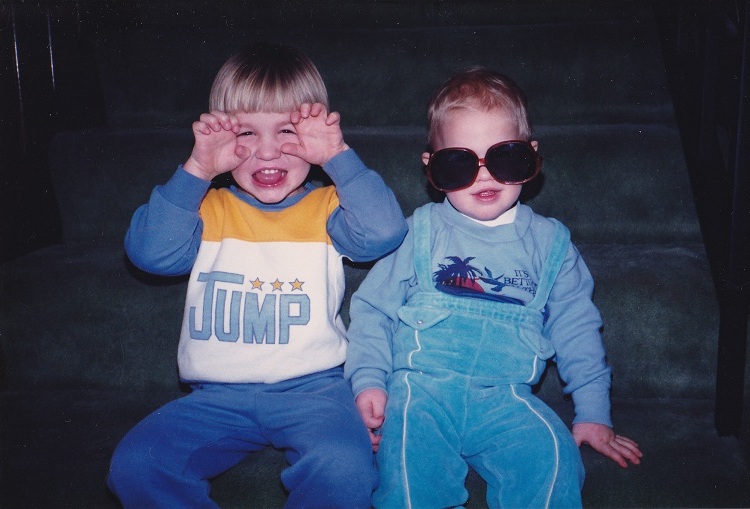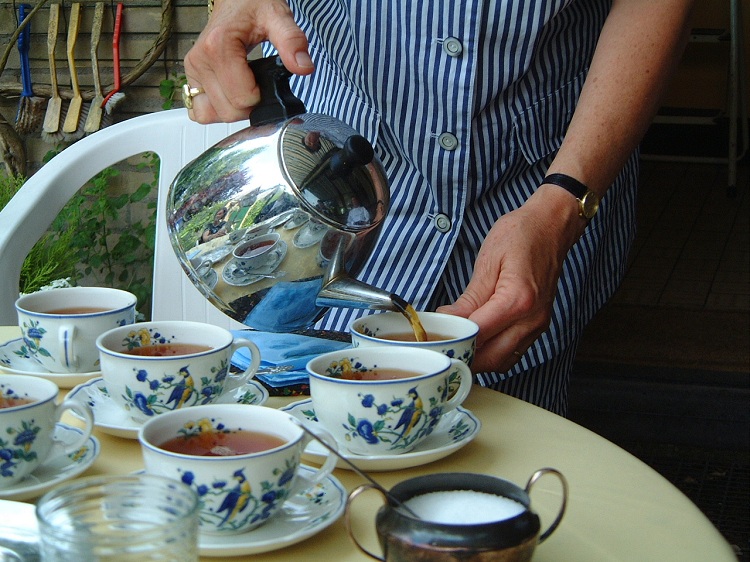This is a post I’ve been meaning to write for a long time. It’s a mini-overview of my own spiritual journey, and I call it “the Parable of the Earring,” but it’s really not a parable. It’s more like a fable.
It’s based on something that happened to me in February 2006. At the time, I was packing up my apartment and preparing to move in with my elderly parents. (As an aside, this didn’t work out too well for any of us, and a few months later I was again packing up, but that’s another story.)
My son (aged 22 at the time) and I had agreed to meet for breakfast at Cora’s Restaurant — one of our favourites. I had decided to wear the pair of earrings he’d given me for Christmas in 2004. And it was still cool outside, so I was wearing a camisole underneath my sweater and a designer jacket on top. This is the way I dress in winter, spring, and fall, because, as anyone who knows me will tell you, I’m a human popsicle. Always have been.
Somehow, between the time we arrived at Cora’s and the time I got home, I lost one of my earrings.

The very earring (c) JAT 2015
Now, if you know me, you’ll also know I’m very sentimental about gifts from my son, and the fact that I’d lost one of the earrings he’d picked out for me upset me greatly. They were handcrafted from two Gerbera Daisy petals that had been coated in some sort of clear resin, and they dangled delicately. (My son knows me well.)
I also happen to be particularly fond of earrings in general, and some very strange things have happened to me over the years involving earrings, so all in all I was determined to try to track down both the lost earring and any meaning that may have been attached to the loss. (I’m about to get to that part.)
See, although I have degrees in Chemistry and Art Conservation, and although I continue to follow advances in science, I’m willing to be open-minded about the nature of reality. Not open-minded as in “brain like a sieve.” Open-minded as in humble about my own ability to understand quantum theory and open to the idea that human scientists can (and do) make plenty of mistakes.
When the laws of Newtonian physics clash head-on with the laws of particle physics and quantum mechanics, I go with the quantum stuff. This means I’m not bothered or troubled or upset when weird shit happens — when things happen that seem to defy the laws of Newton and classical physics. I don’t see these events as “paranormal.” I see them as entirely normal in a universe that’s built on scientific laws too advanced and too interconnected with divine love for us to detect them with Newtonian equipment like the Large Hadron Collider.
(Every time I think of how many hospital beds could have been funded with the money that went into the LHC, I just want to cringe.)
Anyway, what I’m trying to get at here is that I believe — and many other reasonable people also believe — in an interconnected reality where some things happen to us for a reason. Not all things, but some things. Sometimes weird things happen, and they’re meant to draw our attention to a question or a problem or an answer or an issue. You can call these weird things messages. Or signs. Or sychronicities. Or angel hugs. Or the language of God. You can call them whatever you want as long as you’re open to the idea that you’re NOT alone in a vast, uncaring universe governed solely by the cold and heartless laws of classical physics. There’s a God and there’s a whole family of loving angels (persons-of-soul) around us, and they’re always talking to us whether we like it or not.
And trust me — there’s no way in heaven or earth you can make them shut up.
This isn’t the hard part. As I mentioned above, a lot of regular, reasonable, practical people instinctively know that certain events hold a deeper meaning, a deeper significance for them and their families, than the obvious Newtonian one.
The hard part is interpreting the meaning correctly.
Herein lay my difficulty in the early years of my spiritual journey. In the first few years, I naively allowed myself to be convinced that certain well-known New Age interpretations of divine intervention were correct. I created a whole lot of pain and embarrassment for myself and my family as a result.
So allow me to present the Parable of the Earring. In this parable, I offer a series of “yearly vignettes,” each of which describes how I would have reacted to the loss of my beloved earring in each of the early years of my journey. You can see the changes in my belief system from year to year, starting 15 years ago. You can also see how long it took me to accept some of the common sense teachings of my own guardian angel, Zak.
Okay. Let’s start with 1996.
Context: No spiritual interests to speak of. Marriage is on the brink of collapse (husband is having a serious affair with his secretary). Son is 12 years old.
“Crap. I lost my good earring. It’s his fault. If I hadn’t been so preoccupied with all our problems, I would have noticed my earring fell out. They should make those earrings with better hoops so they don’t fall out so easily.”
1997
Context: Marriage is shaky but still intact. I now work in mental health administration. Starting to be curious about books in the New Age section.
“Oh! I lost my good earring! I should try to let it go and not be upset. But I feel so guilty about losing it. My son’s feelings will be so hurt. Maybe I can try to find a replacement so he won’t notice.
1998 (The Big 4-0)
Context: Still married, still working, but actively pursuing alternative healing methods to try to deal with health issues. Starting to attend New Age workshops and conferences. First meeting with Reiki healer Grace.
“My good earring is gone! Does this have a meaning? I’ll consult one of the new books I bought and follow the instructions for getting help from an angelic guide. Are you there, angels? Tell me where my lost earring is. Why aren’t you answering, angels?”
1999 (A really, really bad year)
Context: Spending more and more time with the “spiritual” group that has formed around Grace. Now preoccupied with cleansing negative energies, past-life karma, and soul contracts through Reiki and energy healing techniques. Frustrated in attempts to learn to channel.
“Someone has taken my earring! I protected myself with a dome of white light this morning, and the earring has sacred energy, so it must have been taken by a negative entity! I must not be trying hard enough to cleanse myself and my home of negative energies! What am I doing wrong?”
2000
Context: In the autumn I tell my husband I’m leaving. I move into my own apartment. Still have strong ties to Grace. Old mistakes with friends come back to haunt me (metaphorically speaking). I discover I can channel and am good at it. Learn guardian angel’s name is Zak.
“Zak, my good earring is gone. I know you must be trying to tell me something. What are you telling me? What did I do wrong now?”
2001
Context: Intensive work on spiritual learning with Zak. No job. Living off separation settlement. Trying to repair relationship with son. Struggling to understand what forgiveness is and what judgment is.
“[Sigh]. The earring my son gave me is gone. It’s a message, isn’t it? A message about being attached to things, isn’t it? I’ve been too sentimentally attached to the earrings, and you’re telling me I’m not trying hard enough to let go of worldly things, right? Of course that’s right. I’m not worthy of your forgiveness.”
2002
Context: An entire year of trying to live as a semi-ascetic. I stop wearing makeup and nice clothes. I stop eating food that has “unnecessary ingredients” (like taste). I give away a lot of my savings to charities. Grace and I decide to become business partners in a rural “spiritual healing centre.”
“I suppose I should give away this set of earrings. I don’t need them anymore. But I can’t seem to find the courage to give them away. Please forgive me for not trying hard enough to obey your teachings.”
2003
Context: An entire year trapped in a house with a woman who has serious unresolved medical and psychiatric issues. Slowly beginning to realize she has no interest in changing. Springtime epiphany about asceticism (a major turning point).
“Omigod, you mean it’s okay with you, Zak, if I need to feel good about my appearance? You mean other people (like Grace) will treat me like a doormat if I treat myself like a doormat? Why didn’t you tell me this before? Where are those earrings my son gave me? It feels so good to wear them!
2004
Context: The spiritual healing centre idea collapses, and Grace and I sell the property. I move to a different town in June. Zak ramps up the scientific angle on spiritual practice. I start to research neurophysiology. The Amen Clinic in California agrees to include me in their Normal Brain Study despite my up-front claim of being able to channel.
“Shit, I guess I lost my earring. Maybe it’s a good idea not to wear that style of earring when I’m wearing a turtleneck sweater. Oh well, live and learn. As you say, not everything’s a message. Zak, have you seen my car keys?”
2005
Context: Zak explains the Christ Zone model and suddenly the behaviour of spiritual gurus makes perfect scientific sense. I break off all ties with Grace. I start to write a book with Zak’s help.
“What do you mean my angel team could actually move the damn earring if they wanted to!? I thought we were past all that. What do you mean I need to read up on non-locality? How am I going to explain this to regular people? Can’t we just stick with the neurophysiology?”
2006
Context: Agreement early in the year to move in with my parents. Great emotional stress. I move anyway because Zak asks me to trust him. I end up in hospital with a stress-induced G.I. illness. After I recover, I move back to my home. I discover during this time of intense emotion that together Zak and I can speak directly with God the Mother and God the Father. (Didn’t know this was possible.) Immeasurable gratitude.
“Huh. How ’bout that? I’ve lost another earring. Wonder where I’ll find this one? Zak, you and the rest of the team cheer me up so much with your crazy antics. Moving things here, moving things there — just when I need a smile the most. Hey, look at that! There’s my lost flower earring. It’s stuck right to the skin of my stomach. Can’t explain how it got there — how it got past the turtleneck collar of my sweater and past my camisole and past my bra to land on my stomach without my ever feeling it. But I sure am glad to have it back. Thanks, everyone!”
And fast-forwarding to today . . .
The only “mini-dialogue” I didn’t make up here is the very last one. After I realized I’d lost my cherished earring in 2006, I searched my car, I searched the ground outside my apartment, I even went back to the restaurant and asked if anyone had found it. No luck.
Later that day I changed out of my clothes, and that’s when I found my flower earring. Stuck to the skin of my stomach.
As I said above, weird things happen in a universe filled with divine love.
And I still have those earrings!
Posted in
angels (i.e. persons-of-soul),
building your intuition,
Christ Zone,
Divine Love,
healing,
miracles,
My Spiral Path,
mystic,
spiritual practices,
The Blonde Mystic and tagged
building your intuition,
spiritual practice in the 3rd millennium |
 This post is the final essay in the Blonde Mystic series. I hope you’ve enjoyed reading it as much as I’ve enjoyed writing it.
This post is the final essay in the Blonde Mystic series. I hope you’ve enjoyed reading it as much as I’ve enjoyed writing it.












